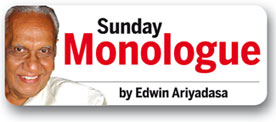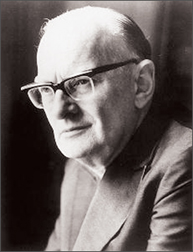World without Sir Arthur C.
"I take a lot of Sri Lankan tea and convert it
into science fictions.
Sir Arthur C. Clarke Quoted by Nalaka
Gunawardene his associate for 27 years

|

Sir Arthur C. Clarke : Universal Sri Lankan citizen |
Some sages who appear on earth from time to time, disturb the sleep
of mankind for ever. After they profoundly alter the thinking of men and
women, human life will never be the same again.
Charles Darwin, who formulated "The Theory of Evolution by Natural
Selection," Scandalizing his contemporaries, and Sigmund Freud the
founder of Psychoanalysis, come within this coterie of global savants.
Arthur C. Clarke the effects of whose concepts impact upon every
human beings on earth is an elitist member of this exclusive group of
global sages. Sri Lankans can be justly proud, that Arthur C. Clarke
lived more than half his life, here in our land.
By training and relentless commitment, Arthur C. Clarke was close to
space. By birth he was close to the earth, as he was born into a family
of traditional farmers, in Minehead, Somerset, UK. He was born on the
16th of December 1917. He passed away to use his own terminology - after
orbiting the sun for 90 years. His orbiting round the sun, in living
physical form, may have terminated on 19 March 2008. But, his interred
remains and his pervasive influence will continue in solar orbit, for
ages to come.
As a child too, Arthur was fascinated by space. In his early days he
derived pleasure through star-gazing.
In his youth, he could not afford a university education, due to
monetary constraints. It is ironical to reflect, in this context, that,
in later years honours and degrees were lavished upon him and that,
billions were earned (and, are being earned even today) by those who
could utilize the applications of his concepts. He began his career as
an auditor in the pensions section of the Board of Education UK. His
career blossomedforth into its golden era, towards the end of World War
Two.
The twin dexterities of keen conceptualisation and compelling
articulation both in the written word and the spoken word, ensured a
timeless audience for what he chose to say.
He commanded the attention of the global community of scientists, by
his theoretical essay on geostationary satellites. In his article titled
'Extra-terrestrial Relays,' that appeared in the London publication
'wireless World' for October 1945, he set down his concept. If a
satellite is lifted 22,300 miles into space it will be geosynchronous
that is, it will rotate the same speed as Planet Earth. In consequence,
from a given point on Earth it may seem geostationary - that is, as if
it remains unmoving.
I remember reading somewhere, that he received a fee of US$ 45 for
this article. It will be interesting to find out what the
Rupee-conversion rate for a US Dollar was, back then.
A satellite so lifted, will be a communications centre in space.
Placing three of those, at three specific points in space above earth,
live messages could be relayed, right round the earth, merely in six
seconds. He never patented this concept. Modestly, Sir Arthur claimed
that he was not the father of this concept, but only its God Father.
This was a daring forecast. There were no rockets to send a satellite
so far up into space. The computer and the transistor were still in the
offing.
Overcoming all the odds, the first communications satellite 'Early
Bird', was lifted into space in April 1965, exactly as Arthur C. Clarke
visualized in 1945.
Arthur C. Clarke's concept turned into practical reality and the
world and the global community were ushered into the new miraculous era
of Satellite Communication.
By the time Arthur C's theory, metamorphosed into pragmatic reality
and the first communications satellite "Early Bird" occupied its perch
22,300 miles up in space, the author of the concept was here in Sri
Lanka.
Miraculously, Sri Lanka, had become, in a way, the centre of the new
age of satellite communication. Somehow it seems to me, that, the full
significance of this super event, did not quite sink into the Sri Lankan
psyche deeply. If it did, as a nation, we would have arranged to utilize
our opportunity much more profitably, enabling us to occupy an exalted
position in the global map of advanced communication.
Sir Arthur C. Clarke, arrived in Sri Lanka, way back in 1956 as a
young man of 39. When he passed away at 90, in 2008, he had spent more
than half of his life-span (51 years) here in Sri Lanka.
Initially, he settled down in Unawatuna, South of Galle. He was
enamoured of the beauteous beaches of Unawatuna. (personally, I cannot
help but feel a heightene sense of joy about Arthur C. who knew his
universe, opting to settle down at Unawatuna, as I hail from there.)
Eventually Arthur C. moved to Colombo. Arthur C. Clarke had the
exceptional good fortune to personally experience the changes brought
about in human life, Through his concept of the communications
satellite.
In his early days in Sri Lanka, if he needed to telephone London, he
had to book a trunk call. Since it would take an hour, two hours or even
more, to connect the call, he would keep the telephone on his dining
table. But, after the communications satellite became a reality, he
wrote, "Now when I dial 13 digits for London, I find London responding
with a "Hello", even in less time than it took for me to dial the 13
digits."
Arthur C. Clarke received the higher global recognitions, when he was
residing in Sri Lanka. He was nominated for the Nobel Peace Prize. He
was also nominated for an Oscar Award. He won the UNESCO-Kelinga Prize
for the Popularization of science. He won most of the high science
prizes and awards for science fiction.
But, when we indulge in a stark self-scrutiny as a Nation we with
undoubtedly regret, that we did not know how to benefit from such a
universal Treasure. On the other hand, there were instances when insults
and abuses were hurled at him. When he was presented a knighthood by the
Queen he had the investiture put off for some time, because of a scanted
aimed as smearing his personality our greatest failure as an under
developed nation, is our incapacity to make the best use of the
unparalleled assets we possess.
Here, we must praise the gesture of President Mahinda Rajapaksa for
celebrating Sir Arthur's 90th birthday at state level.
Sir Arthur was one of the freest spirits, that walked the Earth. He
was unencumbered by convention or dogma. At one point he described
himself as a crypto-Buddhist later on.
I was told that, he had an inclination to drop the adjective "crypto"
I am happy that he sent me his touching greetings on my 85th birthday (3
December 2007) just 13 days before his 90th birthday.
Addressing me as Deer Edwin, he said, "I see that you are catching up
on me. I'll be turning 90 on 16 December. I also take this opportunity
to thank you for many decades of popularising my ideas and visions among
Sri Lankans through newspapers, radio and television. I wish you many
more years of action as the "elder statesman" of Sri Lankan media.
I quote this not as an ego-tour, but to stress the personal warmth of
this Great Sage) He was Sri Lanka's space station and the antenna to the
universe. We must initiate national programs to honour this universal
Sri Lankan Citizen. |

